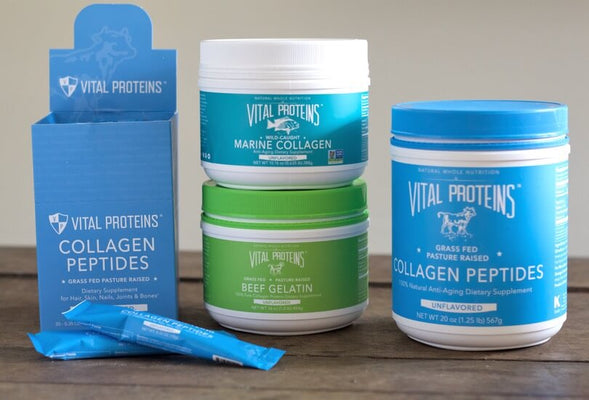Collagen tops the list of abundant proteins found in our body. It plays an essential role in holding together muscles, bones, skin, and connective tissues, providing structure and strength. There are 28 different types of collagen found in our body. However, type I, II, III, and IV are the most common ones.
Get a free sample pack!
All connective tissues are rich in Type I collagen. The joints usually have type II collagen. Type III collagen is an essential component of the blood vessels and skin, and type IV is found in the eye lens, inner ear, and kidney.
As age advances, there occurs a disbalance between the production and degradation of collagen in the body. Collagen production shoots up in the mid-20s and starts to decline after that. Therefore, supplying the body with external collagen sources becomes necessary.
Vital Protein is a front-line brand that deals in a line of exciting and delicious collagen supplements to promote the health and wellness of skin, bones, hair, and joints. However, is it possible to find out if they are halal? Read further to find the details unfold and cap your curiosity.

Where Are Collagen Supplements Sourced From?
Collagen is derived from animals. When incorporated into the diet, it serves consumers with the goodness of strengthening their joints, bones, and muscles and improves the texture of their skin. The most important sources of collagen are cows, pigs, fish, and chickens.
Bovine Collagen
This is mainly sourced from cows' tendons, bones, and hides and is a rich source of type I and III collagen. It is used to enhance skin health.
Poultry Collagen
Collagen is also extracted from the cartilage and bones of chickens. The eggshell membrane is used to source the protein too. Rich in type II collagen, this is often recommended to improve bone health and alleviate joint discomfort.
Marine Collagen
The scales and skin of fish like cod and snapper are often used to derive collagen. Collagen extracted in this way benefits the skin, gut, and bones.
Porcine Collagen
Porcine collagen is extracted from the skin and bones of pigs. It is similar to bovine collagen and is rich in type I and III collagen.
When Is Collagen Considered Halal?
The Arabic word 'halal' refers to anything permissible in Islam as per the Quran. Since collagen is sourced from animals, it can be considered Halal only if the animals have been slaughtered, adhering to the laws of Islam. Pork is strictly prohibited in Islam, so porcine collagen can never be halal.
Fish, irrespective of the way it has been killed, will be deemed Halal. For poultry and bovine collagen, the animals' slaughter must be done in the Islamic way to be accepted as Halal. In the Halal way of slaughter, a deep cut is made to the carotid artery, windpipe, and jugular vein of the animal with a sharp instrument, and all the blood is drained out since, in halal, no blood is consumed.
The cut made in this way shocks the animal and leads to death immediately without causing any pain. Before the slaughter, a short invocation to Allah is done. When it comes to collagen supplements, there is no way of knowing if it is halal or not, except for the halal certification presented by the company. You can read the blog to know more about the halal to haram ratio.
Is Vital Proteins Collagen Halal?
Even though none of the products on Vital Proteins' shelves are halal certified, some of them are kosher certified. Kosher is a term used to refer to foods that comply with the strict dietary laws of the Jews. Jewish dietary laws are more restrictive than those of Islam.
However, they follow similar rules for the sacrifice of animals. Therefore, Kosher foods, with the exception of alcohol, are usually considered to be Halal, while the opposite is not true.
The Vital Proteins collagen products, which are Kosher certified, include unflavoured and some flavored collagen peptides, Collagen Creamer, Beef Gelatin, Matcha Collagen, and Matcha Collagen Latte. Their Marine Collagen, made from the scales of wild-caught cod, can be considered halal even without the certification since fish, including all other sea foods, is halal per Islamic laws. You can shop from a premium health supplement store to get your hands on some 100 percent collagen supplements.
Conclusion
All Vital proteins' bovine collagen products are made from grass-fed, pasture-raised cows. However, that doesn't make them halal—the process of slaughter matters. The line of Kosher Collagen can be deemed halal due to the similarity between Jewish and Islamic dietary laws.
Jewish laws are more strict. So, that gives a green signal from the Halal point of view. However, to get further confirmation, it is best to reach out to the company.


